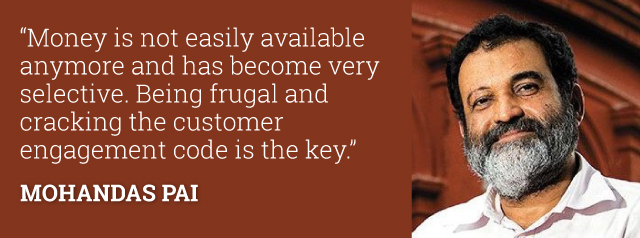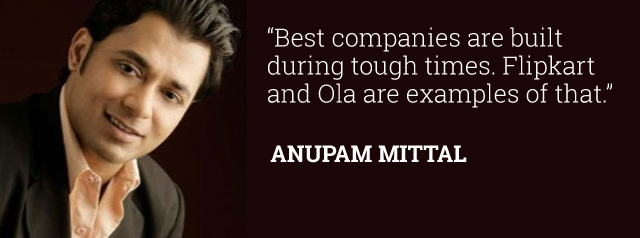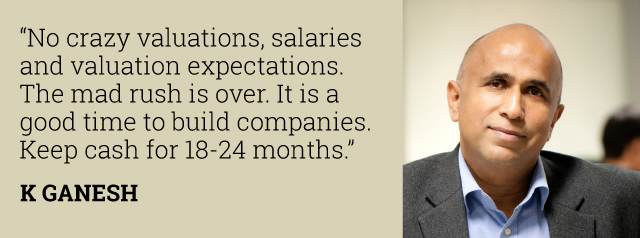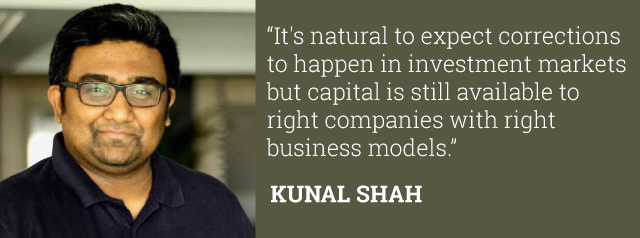
It isn’t a coincidence that the number of advertisements screaming discounts by leading e-commerce players in mainstream dailies has gone down in recent months. One doesn’t see too many startups riding IPL, the most sought after event among advertisers on television, this year either. This is unlike the trend in the past two years when relatively older Internet companies such as Flipkart, Snapdeal and others competed with each other for viewers’ attention.
A separate trend unfolding simultaneously is that of startups from diverse sectors shutting shop even as their peers embark upon cost-cutting initiatives such as cutting spends on advertising and marketing or firing employees. From September last year, Indian startups have fired a little more than 3,000 employees.
In the midst of these developments come reports that suggest investors are increasingly becoming wary of placing big bets on startups. A recent VCCircle report said that from a record $20 billion in 2015, the private equity and venture capital inflow into the country got off to a tepid start in the first quarter of 2016. The VCCEdge data cited in the report shows a drastic 80 per cent fall in venture capital funding so far this year.
While the reasons for startups downing shutters vary from flawed business models to crowding in of nascent sectors that are too small to accommodate a large number of players, one factor that is common to all the three developments mentioned above is the constrained supply of capital. The Techcircle Startup 2016 summit in Bengaluru on Thursday will discuss these issues in detail.
End of easy money
Mohandas Pai, angel investor and chairman of the venture capital firm Arin Capital, agrees that funding is increasingly getting difficult to come by. “Money is not easily available anymore and has become very selective.”

A partner at a venture capital firm with a portfolio of big Internet companies agrees with Pai’s diagnosis. “This is the most challenging environment in the last five years for early-stage ventures,” he says, adding that it may not necessarily be a bad development. “The current cycle of venture capital funding that peaked last year was built over five years starting 2010. This kind of a downtrend is good. Otherwise, people tend to forget startups are real businesses. Unit economics has become the key factor for new startups,” he says.
Time to build
On the face of it, startups shutting shop, employees getting fired and investors becoming stingy do not sound like positive developments. The veterans in the business, however, argue to the contrary.
“Globally, best companies were built during tough times. Google emerged after the dotcom bust of the 90s and Facebook, post 2008 recession,” says Anupam Mittal, founder of People Group. A prolific angel investor, Mittal is one of the earliest Internet entrepreneurs in the country and founded matrimonial site Shaadi.com and property site Makaan.com. “In India, some of the big companies were founded during tough periods. Flipkart in 2008 and Ola in 2010-11 found it extremely tough to raise money,” he adds.

Financial crunch has some positives, says K Ganesh, founder of venture building platform GrowthStory. “This is the best opportunity to build companies. Crazy discounting is no longer there, no mad race for customer acquisition because money is in short supply. People are not paying crazy salaries and have stopped splurging on ads,” he adds. GrowthStory has backed a dozen startups such as BigBasket, BlueStone, Portea and FreshMenu. Most recently, it funded on-demand chat app MagicX. “Expectations have come down. You will get people for lower salaries and nobody is asking investors crazy valuations,” he adds.
Mittal says tough times make entrepreneurs wiser and they choose routes they will avoid when the going is good. “Instead of people, startups now have to focus on product (business model). Instead of brand spends, you have to build customer engagement.”
Changing metrics
To be sure, the changing times are changing the way businesses were run so far. While earlier six to 12 months of cash reserve was considered a comfortable situation as entrepreneurs were confident about raising the next round of funding before any crisis set in, the scenario has changed now. “We are now asking our companies to ensure a runway of 18-24 months,” says Ganesh.
Likewise, e-commerce companies earlier chased gross merchandise value. But now GMV is not the right metric to define consumer Internet businesses. Ganesh says investors are now looking at unit economics, margins and a path to profitability instead of GMV figures.

“It is far easier to build businesses in a downturn that in euphoric times. People have time to think and strategize; there is no mad rush,” he says.
Startup evangelists are of the view that venture capital is still available. It’s the investors that have become selective and cautious. Making the argument, Mittal of People Group says: “Please remember, $3 billion of dry powder is still sitting with venture capitalists.”
Kunal Shah, founder of Freecharge, says companies with the right attitude will not find it difficult to raise funds. “It's natural to expect corrections to happen in investment markets but capital is still available to right companies with right business models,” says Shah. He believes any company that demonstrates sticky consumer behaviour, good unit economics and a big market to play in, will never find shortage of growth capital.
Investors as well as those chasing them agree that difficult times call for difficult measures, and it is time for startups to conserve cash and look at alternate ways of building scale. “Being frugal and cracking the customer engagement code is the key,” says Pai.

“Instead of trying too many things, this is the time to focus on one or two strong business streams and cities to enter,” says Srikanth Sundararajan, venture partner, Helion Ventures. “It may be relatively easier for well-funded segment leaders to scale up in the current environment. But they too should have a track record of judicious cash flow management,” he adds.